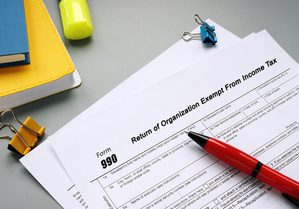Are you a board member of tax-exempt organizations under section 501(a)? Then you have the responsibility to receive and review Form 990, Return of Organization Exempt from Income Tax, before its annual filing to the Internal Revenue Service (IRS). Form 990, an IRS inquiry into governance-related matters of tax-exempt organizations, helps ensure that an organization fulfills its tax-exempt purpose and that financial resources are used to further that purpose. It also helps maintain accountability and transparency of activities, governance and relationships. The board should critically analyze and evaluate policies, practices and finances before approving Form 990 because it provides the public with financial information about the nonprofit organization.
There are some exceptions to the types of organizations required to file, including certain:
- Political organizations
- Organizations with limited gross receipts
- Religious organizations
- Governmental organizations
This article outlines Form 990 best practices and discusses the importance and legal ramifications of adopting such policies.
Best Practices With Form 990
As demand for transparency and accountability increases in the nonprofit sector, Form 990 helps prevent nonprofits from abusing their tax-exempt status. Nonprofit organizations can implement the following best practices when preparing Form 990:
- Educate board members on oversight – Many nonprofits outsource Form 990 preparation to a certified public accountant (CPA), legal counsel or other tax professionals. Directors can employ this expertise to provide training to the board to better understand what is being reviewed.
- Provide a copy to the board before filing – Form 990 Part VI, Line 11a, asks whether the organization provided a complete copy of this Form 990 to all members of its governing body before filing. While there is no legal requirement that the board reviews Form 990, failing to do so can reflect poorly on the organization.
- Develop a Form 990 review process – Form 990 Part VI, Line 11b, requires the organization to outline how officers, directors, trustees, board committee members or management reviewed Form 990. Developing a board review process helps address potential questions and catch errors before submission.
- Work with an attorney or CPA to answer any policy questions that arise – The board should reach out to the nonprofit’s attorney or CPA when questions arise about governance policies. Reviewing policies and discussing them with experts can help determine if changes or modifications are needed.
- Develop written policies – Form 990 is available for public inspection for three years following its filing. Nonprofits have to answer questions about its governance policies or lack of policies. Even though governance policies are not required, failing to have them can reflect poorly on a nonprofit, harming its reputation with the IRS and the public. Further, not having governance policies can expose organizations to risk of abuse.
Importance of Adopting Policies
While there may not be severe penalties for boards that don’t have policies for reviewing Form 990, not having them may trigger an IRS audit. There can, however, be severe legal penalties under the Sarbanes-Oxley Act (SOX), making it imperative for board members to understand roles and policies concerning Form 990. In addition, due to its public disclosure requirements, neglecting to review Form 990 could paint the organization in a negative light, affecting current and potential supporters.
Due to this, nonprofits should consider developing written policies on the following topics:
- Board review – Approaching Form 990 from a high level can help determine areas of the form that warrant a deeper review. A written policy can keep the review on track and ensure that all parts are fully completed.
- Audit committee – A tax-exempt organization must declare whether it has an audit committee on Form 990. A written policy documenting the roles and purpose of the audit committee can ensure the committee’s continued operation.
- Whistleblower policy – A carefully crafted whistleblower policy can protect anyone reporting wrongdoing. Having a well-publicized written policy gives organizational members the freedom to file a report without fear of retaliation. While SOX came to be in response to publicly held corporations, there are two criminal provisions that apply to nonprofits:
- Strengthened whistleblower protection; and
- Retention of documents related to lawsuits.
- Conflicts of interest – Well-developed conflict-of-interest policies identify potential conflicts, determine the risk of the conflicts and outline how the organization should handle conflicts. Involving a CPA or other legal professional in the identification process can ensure an independent assessment of all conflicts of interest.
- Financial statements – Form 990 reports on a variety of financial information. Develop a written policy to ensure that financial statements are compiled, reviewed and audited by an independent accountant.
- Executive compensation approval process – The board should have a process to approve and document compensation payment. If a director identifies an issue with compensation on Form 990, the board should have a written policy to best address it.
- Document retention and destruction – Working with a CPA can help establish appropriate policies for the retention and destruction of documents under SOX.
- Meeting minutes – Having a standard meeting minute process can ensure that the documentation of information remains consistent.
- Joint venture policy – In the instance that a joint venture or strategic alliance forms, nonprofit organizations should have a joint venture policy to protect the nonprofit’s tax-exempt status and minimize unrelated business taxable income.
- Acceptance of gifts – A written gift acceptance policy can protect the organization from risks—including public relation risks—by educating officers and board members on how accepting gifts can affect the nonprofit’s desired public image.
Finally, nonprofit board members have fiduciary responsibilities they must fulfill, including:
- Duty of care – Board members must give the same care and concern to their duties as a reasonable, prudent person would in the same circumstances.
- Duty of loyalty – Board members must place the interests of the organization ahead of their own. Conflicts of interest must be publicly disclosed, and board service should not be a means for personal or commercial gain.
- Duty of obedience – Board members must ensure the organization follows all laws and regulations and does not engage in any illegal activity.
To fulfill their duties of care, board members should actively participate in reviewing Form 990.
Implementing governance policies and reviewing Form 990 can protect organizations from error, increase sponsor or donor support and reduce the likelihood of being flagged for increased auditing by the IRS.
Material posted on this website is for informational purposes only and does not constitute a legal opinion or medical advice. Contact your legal representative or medical professional for information specific to your legal or medical needs.




